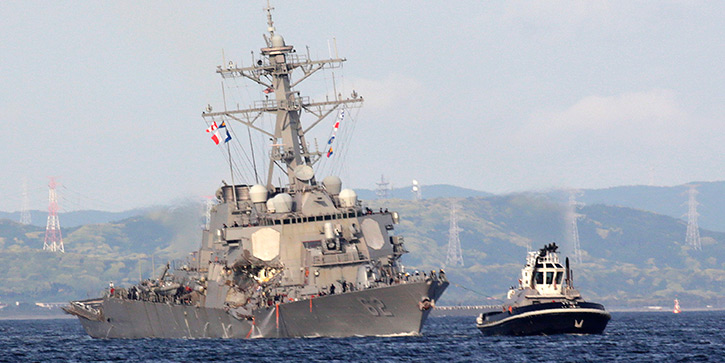Five years ago this month, Ukraine’s “Euromaidan” Revolution led to Russian forces occupying the Crimean peninsula and parts of Eastern Ukraine. The US and Europe imposed economic sanctions in response. Pundits like me proclaimed a new Cold War.
Fast-forward to 2019. That standoff is still in progress and has intensified in some ways… and we have another one brewing with China.
The two conflicts differ, mainly due to China’s deeper trading relationship with the West. Trade frictions make that cold war economic as well as geopolitical. So it’s really double-trouble.
A cold war is certainly better than a hot one. Despite all its industrial strength, most analysts think China is a long way from presenting a credible military challenge to the US. Our well-trained, technologically superior navy can easily handle China, we’re told.
What if that assumption is wrong, though?
Among other things, it would mean some of our macroeconomic assumptions are wrong too. So maybe we ought to question it.
Death at Sea
On June 17, 2017, the destroyer USS Fitzgerald collided with a civilian cargo ship just after leaving port in Yokosuka, Japan. Seven American sailors died and dozens more were injured. It was the US Navy’s worst accident at sea in decades.
As if that hadn’t been awful enough, two months later it happened again. The USS John S. McCain crashed into an oil tanker near Singapore. Ten more sailors died.
Both ships belonged to the storied 7 Fleet, our navy’s largest, most powerful, and arguably most critical battle force. It defends our allies in Asia and guarantees free navigation for the entire Pacific.
And two of its high-tech ships, equipped with every imaginable defensive technology, were disabled by… unarmed civilian vessels.
Official investigations blamed the two ships’ captains and crew, as well as the admiral commanding the 7 Fleet. Certainly they made serious mistakes. But a new, in-depth review by ProPublica says the blame goes much higher—and worse, very little is happening to fix it.
ProPublica’s two-part series (Part I, Part II) is lengthy, dramatic reading. It recounts great heroism as sailors fought to save their ships and each other’s lives. It also shows the accidents happened because the Navy handed expensive technology to poorly trained, exhausted sailors and assumed everything would work perfectly.
It didn’t.
That part matches my own long-ago military experience. The Army would send us fancy new equipment we had no idea how to use or maintain. I don’t think this was just me. I’ve heard similar stories from veterans of all branches, going back to the Vietnam era and before.
The 7 Fleet may have those same issues now. This is a problem, since we depend on it to keep global free trade humming.
Hollow Navy
To be blunt, how is it even possible for a modern naval vessel to collide with a large, slow-moving cargo ship? They’re not hard to spot.
I talked to someone who served on a similar destroyer in the 1980s. He found it baffling. In his day, in addition to sonar and radar, they had human lookouts posted on all sides of the ship. The lookouts were in constant communication with other sailors who plotted every nearby vessel’s location and course on a map. Collisions like these were inconceivable.
According to ProPublica, at some point in recent years the human lookouts became optional. The Fitzgerald had none that night. It had a radar system that wasn’t working right while the only repair technician was away on medical leave.
The sailors on duty did what they could. It wasn’t enough.
The Pentagon and defense contractors say our forces have the latest and greatest technology. The fleet is ready to face any foe… except, apparently, those pesky container ships and oil tankers.
In fact, we appear to have an expensively equipped Navy that skimps on people and training. That’s not so surprising if you think about it. New radar systems generate revenue for someone. Human lookouts don’t. Guess which one the government favors.
We could talk about whose fault this is, and there’s plenty of blame to go around, but the result is the same. The assumption that the US has the military upper hand on China is just that—an assumption. No one really knows if it is true… and some of the signs aren’t good.
Perceptions Matter
The problem here is that China has a history of “leapfrogging” ahead of US technology. That’s partly because the US frog slows down. Former Deputy Assistant Defense Secretary Mara Karlin recently told Axios,
"It can be very easy to keep doing what we’re doing, especially when it has borne at least some fruits, and profoundly difficult to shift away from our institutionalized, regimented processes."
Unburdened by such legacies, China is advancing quickly in key defense technologies like drones, quantum computing, and cyber warfare… some of which could render our destroyers and aircraft carriers irrelevant.
Perceptions matter. Whether China is really superior is one question. But if the Chinese government believes itself superior, it will behave differently in trade and other negotiations.
The Fitzgerald and McCain incidents gave China good reason to suspect US power is hollow—and the US isn’t doing much to counter that perception.
Throwing more money at defense contractors probably isn’t the solution. It may be part of the problem.
Economic power depends on military power. This suggests the balance could change sooner and more profoundly than many of us think. That’s not a certainty, by any means. But it’s not impossible either.
See you at the top,





